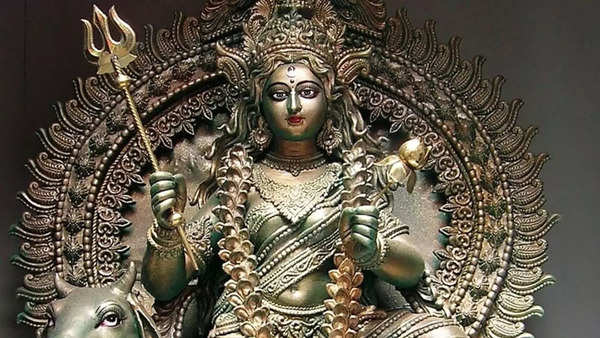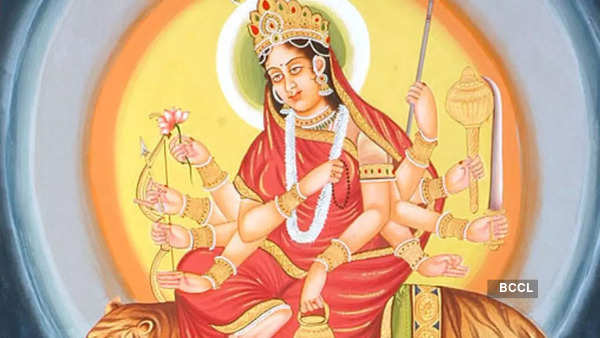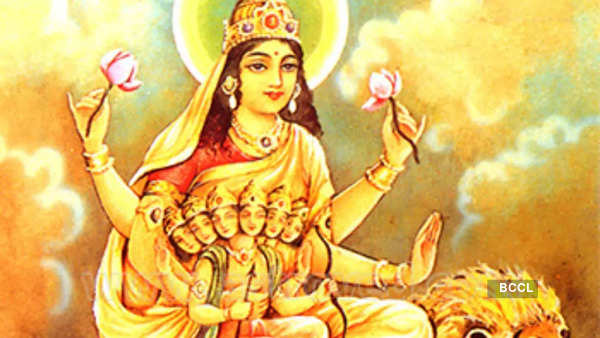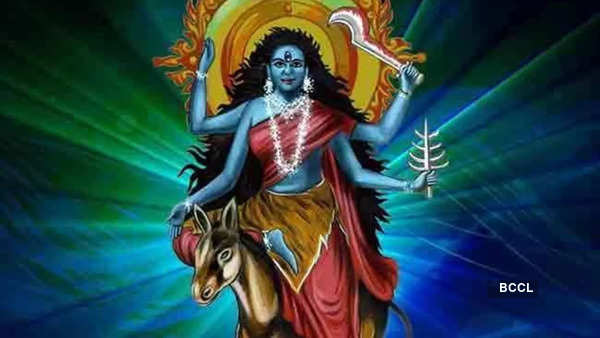Read Also
Navratri, a nine-day festival dedicated to Goddess Durga, is about to begin on October 15th. During this time, people observe fasts, set up pandals, and engage in various cultural activities. The festival is celebrated with enthusiasm across India, with different regions having their own traditional
Shardiya Navratri 2023 will begin on October 15 and conclude on October 24. During these nine days, people worship the nine forms of Goddess Durga. The forms include Maa Shailputri, Maa Brahmacharini, Maa Chandraghanta, Maa Kushmanda, Maa Skandamata, Maa Katyayani, Maa Kaalratri, Maa Mahagauri, and
Shardiya Navratri 2023 will begin on October 15th and end on October 24th. Each day of the festival is associated with a different color and goddess. The colors represent various qualities and devotees are advised to offer flowers of the corresponding color to each goddess. The colors include pink,
Shardiya Navratri is a time of spiritual reflection, fasting, and prayer. Many Hindus believe that during these nine nights, the divine energy of Goddess Durga is at its peak. Devotees seek her blessings for prosperity, happiness, and protection from evil. They also worship her nine forms, each representing a different facet of her power and grace. These are Shailaputri, Brahmacharini, Chandraghanta, Kushmanda, Skandamata, Katyayani, Kaalratri, Mahagauri, and Siddhidatri.
One of the unique features of Shardiya Navratri is that each day of the festival is associated with a specific colour, which has its own spiritual significance. These colours reflect the mood and attributes of the goddess as well as the devotees. They also add to the festive spirit and joy of the occasion. Many people wear clothes or accessories of these colours during Navratri to honour the goddess and seek her favour.Here is a list of the nine colours for each day of Shardiya Navratri 2023 and their meanings:
Day 1: Pratipada – Orange (Shailaputri)
The first day of Navratri is dedicated to Shailaputri, which means “daughter of the mountains”. She is the first manifestation of Goddess Durga and represents nature and purity. She rides on a bull and carries a trident and a lotus in her hands. She is also known as Parvati, Hemavati, and Sati.

Day 1 is dedicated to the form of Shailaputri, daughter of the mountain God Himavat. Orange is the colour of this day. Source: Wikimedia Commons
Orange is the colour of this day, which signifies energy and enthusiasm. It also symbolizes the dawn of a new beginning and the promise of a bright future. Wearing orange on this day invokes the blessings of Shailaputri for courage, vitality, and happiness.
Day 2: Dwitiya – White (Brahmacharini)
The second day of Navratri is dedicated to Brahmacharini, which means “one who practices austerity”. She is the second manifestation of Goddess Durga and represents wisdom and knowledge. She walks barefoot and wears white clothes. She holds a rosary and a water pot in her hands. She is also known as Tapascharini, Aparna, and Uma.
White is the colour of this day, which signifies purity and peace. It also symbolizes learning, intellect, and enlightenment. Wearing white on this day invokes the blessings of Brahmacharini for clarity, calmness, and devotion.
Day 3: Tritiya – Red (Chandraghanta)
The third day of Navratri is dedicated to Chandraghanta, which means “one who has a crescent moon on her forehead”. She is the third manifestation of Goddess Durga and represents beauty and bravery. She rides on a tiger and wears red clothes. She has ten arms and carries various weapons in her hands. She is also known as Chandika, Rannchandi, and Shakti.

Red is the colour of Day 3 which is dedicated to the form of Chandraghanta which means “one who has a crescent moon on her forehead”
Red is the colour of this day, which signifies passion and power. It also symbolizes love, warmth, and excitement. Wearing red on this day invokes the blessings of Chandraghanta for courage, confidence, and charisma.
Day 4: Chaturthi – Royal Blue (Kushmanda)
The fourth day of Navratri is dedicated to Kushmanda, which means “one who created the universe”. She is the fourth manifestation of Goddess Durga and represents creativity and joy. She rides on a lion and wears royal blue clothes. She has eight arms and holds various items in her hands such as a lotus, a rosary, a kamandalu (water pot), a bow, an arrow, a jar of nectar, a discus, and a mace. She is also known as Adi Shakti, Ashtabhuja Devi (eight-armed goddess), and Annapurna (giver of food).
Royal Blue is the colour of this day, which signifies strength and calmness. It also symbolizes royalty, dignity, and elegance. Wearing royal blue on this day invokes the blessings of Kushmanda for creativity, abundance, and bliss.
Day 5: Panchami – Yellow (Skandamata)
The fifth day of Navratri is dedicated to Skandamata, which means “mother of Skanda (Kartikeya)”. She is the fifth manifestation of Goddess Durga and represents motherhood and compassion. She rides on a lion and wears yellow clothes. She has four arms and holds her son Skanda in one of her arms. She also carries a lotus and a water pot in her hands. She is also known as Padmasana Devi (one who sits on a lotus), Parvati, and Maheshwari.

Day 5 is dedicated to Skandamata which translates to mother of Skanda (Kartikeya) The colour for the day is Yellow.
Yellow is the colour of this day, which signifies happiness and optimism. It also symbolizes sunshine, brightness, and cheerfulness. Wearing yellow on this day invokes the blessings of Skandamata for joy, prosperity, and harmony.
Day 6: Shashthi – Green (Katyayani)
The sixth day of Navratri is dedicated to Katyayani, which means “one who was born in the Katyayan lineage”. She is the sixth manifestation of Goddess Durga and represents courage and victory. She rides on a lion and wears green clothes. She has four arms and carries a sword, a shield, a lotus, and a mudra (gesture) of blessing in her hands. She is also known as Mahishasura Mardini (slayer of the demon Mahishasura), Bhadrakali, and Jagadamba.
Green is the colour of this day, which signifies growth and harmony. It also symbolizes nature, fertility, and balance. Wearing green on this day invokes the blessings of Katyayani for courage, success, and health.
Day 7: Saptami – Grey (Kalaratri)
The seventh day of Navratri is dedicated to Kalaratri, which means “one who is the death of time”. She is the seventh manifestation of Goddess Durga and represents destruction and liberation. She rides on a donkey and wears grey clothes. She has four arms and carries a sword, a trident, a thunderbolt, and a mudra (gesture) of fearlessness in her hands. She is also known as Shubhankari (one who does good), Bhairavi, and Chamunda.

Grey is the colour for day 7 which happens to be Saptami. It is dedicated to the manifestation of Durga known as Kalaratri.
Grey is the colour of this day, which signifies subtlety and mystery. It also symbolizes the vastness of the cosmos and the strength to face challenges. Wearing grey on this day invokes the blessings of Kalaratri for protection, detachment, and transformation.
Day 8: Ashtami – Purple (Mahagauri)
The eighth day of Navratri is dedicated to Mahagauri, which means “one who has a fair complexion”. She is the eighth manifestation of Goddess Durga and represents beauty and grace. She rides on a bull and wears Purple clothes. She has four arms and holds a trident and a damaru (drum) in her hands. She also makes mudras (gestures) of blessing and fearlessness with her hands. She is also known as Shwetambardhara (one who wears white clothes), Gauri, and Shailputri.
Purple is a color that is often associated with luxury, grandeur, and nobility. If you worship Navdurga wearing purple, it is believed that she will bestow you with opulence and richness. So, do not be afraid to wear a beautiful purple outfit to receive the blessings of the Goddess.
Day 9: Navami – Peacock Green (Siddhidatri)
The ninth day of Navratri is dedicated to Siddhidatri, which means “one who grants all siddhis (supernatural powers)”. She is the ninth manifestation of Goddess Durga and represents perfection and fulfillment. She rides on a lotus or a lion and wears peacock green clothes. She has four arms and holds a lotus, a mace, a discus, and a conch shell in her hands. She is also known as Saraswati (goddess of learning), Lakshmi (goddess of wealth), and Gayatri (goddess of wisdom).
Peacock Green is the colour of this day, which signifies richness and diversity. It also symbolizes nature’s beauty, splendor, and majesty. Wearing peacock green on this day invokes the blessings of Siddhidatri for perfection, fulfillment, and enlightenment.
These are the nine colours for each day of Shardiya Navratri 2023 that you can follow to celebrate the festival with joy and devotion. May Goddess Durga bless you with her grace and power! Happy Navratri 2023! For more on Navratri related stories, keep looking out this space.

